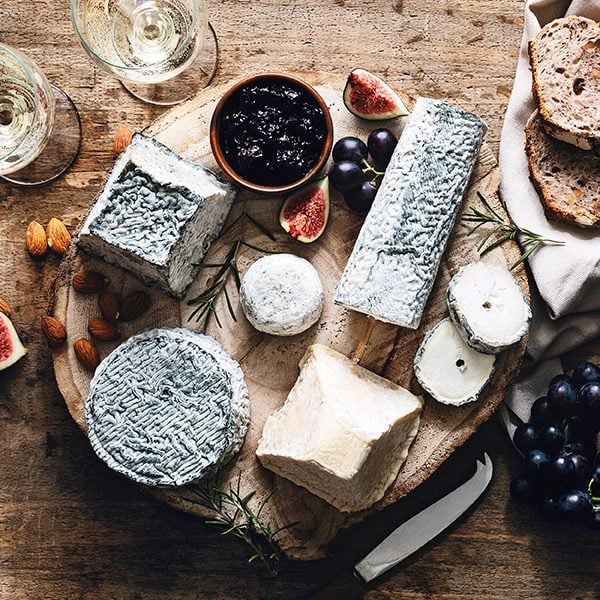Why are the French healthier than Brits?
Despite their love of cheese, sweet bakes and foods rich in saturated fat, the French are healthier than the British. It’s not the red wine that’s doing it, says Sue Quinn – so what’s their secret?

Why are the French healthier than we are?
The French are famously able to have their gâteaux and eat it, too – to enjoy an apparently indulgent diet without damaging their health. In 1980, scientists even coined an expression for this remarkable contradiction: the French paradox. It referred to the fact that in the UK and US, where saturated fat consumption was roughly the same as France, the death rate from heart disease was higher. Researchers attributed this to the French love of red wine, a source of heart-protective plant compounds.
Eventually, the wine theory was discounted. Many more factors are involved in heart disease than just saturated fat, scientists reasoned, and glasses of vin rouge would not make it better. But it is true that the French score higher on key health markers.
Obesity levels in France, although rising, are still much lower than in the UK. The NHS estimates that almost 26% of UK adults are obese, while the figure for France is 17%, according to a 2020 study. What’s more, research by Imperial College London in 2019 found the rate of heart disease deaths in the UK was more than double that of France. So what are the French doing right?
"Obesity levels in France, although rising, are still much lower than in the UK."
A balanced diet
Dr Jean-Michel Cohen, one of France’s leading nutritionists and health commentators, says obesity is an escalating problem in France due to a growing appetite for fast food and ultra-processed foods among young people. Despite that, he adds, the traditional approach to eating, still widely practised, is keeping the French slimmer and healthier than the British for the time being.
“We eat a balanced diet of dairy – like yogurt and cheese – vegetables, fruit and grains,” Dr Cohen explains. “Apart from in the north, where they eat more processed meat and dairy, the French essentially eat a Mediterranean diet.”

A meal in France, as in many Mediterranean countries, often begins with vegetables, Dr Cohen says, either cooked or in a salad. This means that even if rich sauces, cheese or red meat follow, the meal has started nutritiously. France’s latest national dietary survey bears this out. On average, the French consume 400g of fruit and vegetables per day (excluding juice), while in the UK, the figure is 300g, according to the NHS.
Taking time to eat
The French passion for taking time to enjoy food – also a feature of the Mediterranean diet – is another key difference to the British approach. “For the French, eating is much more than just nourishing ourselves,” Dr Cohen says. “We take pleasure in the whole process: shopping, cooking, talking about food and sitting down with family to eat. Pleasure is a fundamental aspect of eating.”
To enjoy food takes time, Dr Cohen says, which is why the French sit down for proper meals at lunch and dinner. Even on weekdays, most workers take an an hour or two off for a meal at home, at a restaurant or in a staff canteen. In contrast, 60% of British workers eat at their desks for lunch, according to one estimate.
“It’s important to get pleasure from food, because you feel more satisfied after you’ve eaten,” Dr Cohen says. “The pleasure we get from food sends signals to the digestive system to start working, so you’re less likely to snack afterwards.”
While the French do enjoy wine, it’s generally consumed in moderation. “The French don’t really drink that much,” says Dr Cohen, “and mostly it’s while sitting down for meals.”

"The French sit down for proper meals at lunch and dinner, even on weekdays."
To snack or not to snack?
The British inclination to snack is a key difference that detrimentally affects our health. According to the World Obesity Federation, we consume almost 683g of sweet and salty snacks per month – more than two-and-a-half times France’s intake of 258g.
“The French don’t snack, apart from ‘du goûter’ – snack time after school – as they tend to eat later than in the UK,” confirms Claudine Boulstridge, a British French chef specializing in healthy food. “The French eat three proper meals – until recently no sandwiches – so people aren’t hungry in the afternoon and don’t resort to snacking.”
The abundance of ultra-processed food on display in the UK – at supermarket checkouts for example – differs from France. “Kids see it and beg for it, and it becomes normal to eat on the go from a packet.”
From a young age, children are taught about healthy eating at school, where they’re commonly served four courses, starting with vegetables, followed by food that would be regarded as challenging in Britain.
“Fussy eating isn’t allowed in France – you eat the same as your family and there’s nothing else,” Boulstridge says. “My kids went to a French summer camp a few years ago and the lunch menu included things like octopus, sardines, pâté and salad. All the children had to eat everything.”
The French approach to eating isn’t perfect. As in most of the rest of the world, obesity rates are rising alongside a growing appetite for unhealthy food. But the traditional French attitude to food and cooking – taking pleasure in both and making the time to do so – could have real benefits for our health and wellbeing in Britain.
7 healthy ideas to borrow from the French
Take your time. Leave your desk for lunch and avoid eating in front of a screen to give your brain and digestive system time to recognise when you’re full. “Take at least 25 minutes,” Dr Cohen suggests.
Prepare meals from scratch. It doesn’t have to be a complicated recipe, so do this wherever possible. “It might be something made with three simple ingredients and a dressing,” Boulstridge says.
Try to sit down and eat with friends or family. It’s not possible all the time, but research shows that frequently enjoying meals with others promotes healthier eating habits.
Start meals with vegetables . “My mum would give us vegetable batons, dips and olives as a sort of aperitif while we waited for dinner to be cooked,” says Boulstridge.
Give up random snacking. Three proper meals each day are a better way to go.
If you drink alcohol, enjoy it in moderation …and with meals.
Avoid children’s menus. Encourage youngsters to eat the same food as adults.
Subscribe to our magazine
Food stories, skills and tested recipes, straight to your door... Enjoy 5 issues for just £5 with our special introductory offer.
Subscribe
Unleash your inner chef
Looking for inspiration? Receive the latest recipes with our newsletter




